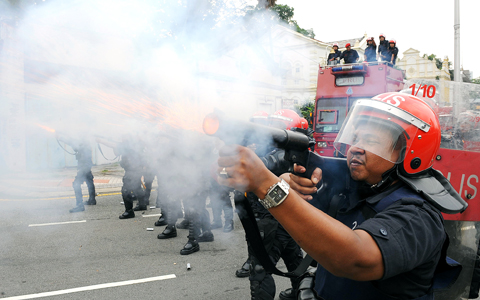Malaysian police fired tear gas and water cannons, and arrested dozens of demonstrators yesterday in an attempt to disperse a mass street protest against Draconian internal security laws.
Thousands of police backed by riot squad officers and helicopters cracked down at three rallying points in Kuala Lumpur — two major mosques and a popular shopping district.
Web news portal Malaysiakini said some 200 people had been arrested as police tried to disperse crowds at the rallying points and scupper their plans to march to the royal palace or the city’s Independence Square.

PHOTO: AFP
At least 50 rounds of tear gas were fired and water cannons were directed at a crowd of around 10,000 people who gathered at the Sogo shopping complex in downtown Kuala Lumpur.
An AFP reporter saw at least 25 people arrested, before the huge group began marching down a main thoroughfare toward the royal palace, triggering the police offensive.
Organizers said they intended to present a 10-point memo to the king, including demands for the abolition of the Internal Security Act, which allows for detention without trial.
They were also calling for the closure of a camp in northern Perak State where detainees are held and an inquiry into all deaths in custody and allegations of police abuse of power.
At the national mosque, where an AFP reporter saw at least 50 detained, opposition Islamic PAS Legislator Siti Mariah Mahmud criticized the arrests.
“This is not reasonable. It’s prayer time and this action is a breach of our religious freedom and duty,” she said.

Indonesia yesterday began enforcing its newly ratified penal code, replacing a Dutch-era criminal law that had governed the country for more than 80 years and marking a major shift in its legal landscape. Since proclaiming independence in 1945, the Southeast Asian country had continued to operate under a colonial framework widely criticized as outdated and misaligned with Indonesia’s social values. Efforts to revise the code stalled for decades as lawmakers debated how to balance human rights, religious norms and local traditions in the world’s most populous Muslim-majority nation. The 345-page Indonesian Penal Code, known as the KUHP, was passed in 2022. It

‘DISRESPECTFUL’: Katie Miller, the wife of Trump’s most influential adviser, drew ire by posting an image of Greenland in the colors of the US flag, captioning it ‘SOON’ US President Donald Trump on Sunday doubled down on his claim that Greenland should become part of the US, despite calls by the Danish prime minister to stop “threatening” the territory. Washington’s military intervention in Venezuela has reignited fears for Greenland, which Trump has repeatedly said he wants to annex, given its strategic location in the arctic. While aboard Air Force One en route to Washington, Trump reiterated the goal. “We need Greenland from the standpoint of national security, and Denmark is not going to be able to do it,” he said in response to a reporter’s question. “We’ll worry about Greenland in

PERILOUS JOURNEY: Over just a matter of days last month, about 1,600 Afghans who were at risk of perishing due to the cold weather were rescued in the mountains Habibullah set off from his home in western Afghanistan determined to find work in Iran, only for the 15-year-old to freeze to death while walking across the mountainous frontier. “He was forced to go, to bring food for the family,” his mother, Mah Jan, said at her mud home in Ghunjan village. “We have no food to eat, we have no clothes to wear. The house in which I live has no electricity, no water. I have no proper window, nothing to burn for heating,” she added, clutching a photograph of her son. Habibullah was one of at least 18 migrants who died

Russia early yesterday bombarded Ukraine, killing two people in the Kyiv region, authorities said on the eve of a diplomatic summit in France. A nationwide siren was issued just after midnight, while Ukraine’s military said air defenses were operating in several places. In the capital, a private medical facility caught fire as a result of the Russian strikes, killing one person and wounding three others, the State Emergency Service of Kyiv said. It released images of rescuers removing people on stretchers from a gutted building. Another pre-dawn attack on the neighboring city of Fastiv killed one man in his 70s, Kyiv Governor Mykola